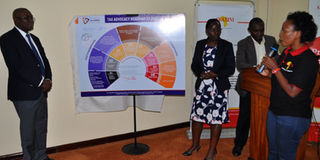Engagement to influence pro-people tax measures, budget accountability takes shape

Mr Moses Ogwapus, Commissioner, Tax Policy Department at the Ministry of Finance and the Country Director of SEATINI-Uganda, Ms Jane Seruwagi Nalunga listening to Ms Regina Navuga, the Programme Officer, Financing for Development Programme explaining the details the engagement to Influence pro-people tax measures during the launch of Civil Society Tax Advocacy Roadmap FY2020/21 in Kampala last week on Friday. PHOTO BY ISMAIL MUSA LADU
What you need to know:
- This roadmap will serve as a plan of action for members to effectively engage in revenue mobilisation, allocation and accountability processes at sub national and national level.
- The CSO tax roadmap is an annual plan that defines the actions that will be taken by TJAU members and includes the major steps/milestones needed to realise a fair, just and accountable tax system in Uganda. It will also serve as a communication tool to enable the public to rally to the cause.
In a move to deepen understanding of tax policy processes and ultimately its ownership, the population and the various key stakeholders including government, must constructively engage throughout the entire (budgeting) cycle.
However, this does not seem to be the case as a huge segment of the population normally get to know about the national budget and pronouncement on policy tax measures on the day it is read in parliament by the Finance Minister.
It should be noted that every year, the Minister of Finance comes up with tax proposals that are presented to Parliament of Uganda to amend existing tax laws. These proposals are aimed at increasing the country’s resource envelop (tax to GDP ratio) to finance the country’s development goals.
The tax policy process entails among others research and a review of current tax policies, drafting and presentation of tax proposals to Parliament by the Ministry of Finance public hearing at Parliament, review and approval of tax bills by Parliament, and consent by the president for the bills to become law.
During this process, consultations are conducted among different stakeholders including CSOs, business community, tax advisors, among others to obtain their input into the tax laws.
However, there is no guiding framework in which stakeholders consult during the process.
This therefore requires interested stakeholders to strategically position themselves to participate in the tax policy process. This explains why so far, the interest on the national budget and tax measure declarations seems to be mainly espoused by policy makers, segment of policy analysts and a section of civil society, with very little participation from the general population who actually bear the brunt of such pronouncement year in, year out.
This trend, if all goes according to plan, may change for the better following the launch of CSO Tax Advocacy Roadmap for Financial Year 2020/21 by the Tax Justice Alliance, whose objective include causing debate around tax policy measures, budget accountability, tax compliance and citizen involvement in the entire budget cycles and processes.
The intention of this, according to the Country Director of SEATINI-Uganda, Ms Jane Seruwagi Nalunga, is to instil citizens’ aspiration into the national budget as well as induce ownership of the whole cycles.
Importantly perhaps, the roadmap developed by the Tax Justice Alliance Uganda (TJAU) and launched last week on Friday, also seeks to engage with government on budget accountability and tax compliance with a view of influencing pro-poor tax laws in the next FY2020/21.
Mr Moses Ogwapus, Commissioner, Tax Policy Department at the Ministry of Finance, said he is excited with the road map saying government needs constructive engagement, noting that out of such efforts a lot can be yielded in that regard.
He however urged for quality research before prior engagement and submission of proposals to the government, something Ms Nalunga said they are not only capable of doing but have a truck record of doing so—delivering superb research.




